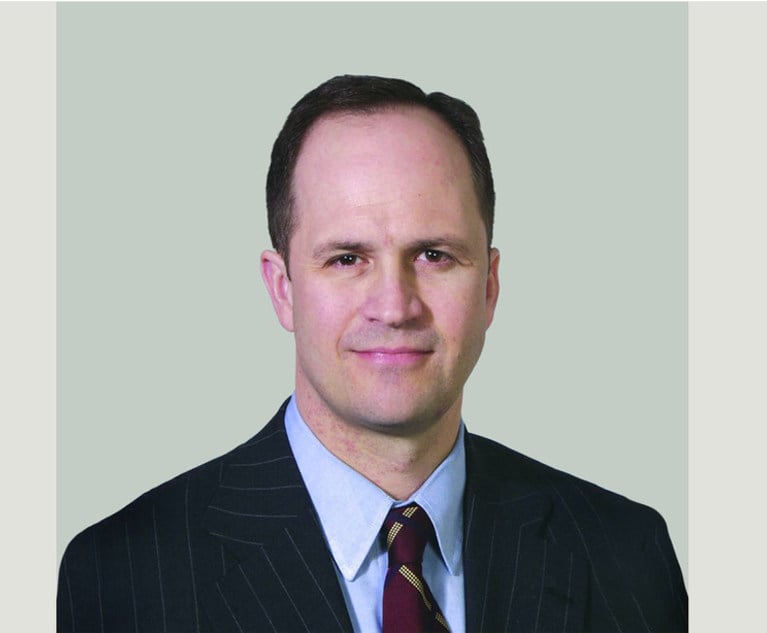Thrivest Asks 3rd Circuit for Stay of Payments to Ex-NFL Players in Concussion Settlement
Thrivest, which is one of three third-party lenders pursuing an appeal over the validity of several funding agreements they have with injured NFL players potentially entitled to settlement funds, filed an expedited motion to the U.S. Court of Appeals for the Third Circuit on Feb. 19.
February 20, 2019 at 03:40 PM
3 minute read
 Photo: Fotolia
Photo: Fotolia
Third-party lending company Thrivest Specialty Funding has asked a federal appeals court to temporarily block the NFL concussion settlement claims administrator from paying injured players whose settlement funds might be subject to third-party funding agreements.
Thrivest, which is one of three third-party lenders pursuing an appeal over the validity of several funding agreements they have with injured NFL players potentially entitled to settlement funds, filed an expedited motion to the U.S. Court of Appeals for the Third Circuit on Feb. 19. The motion asks the appeals court to impose a stay on processing the payments pending the outcome of that appeal.
Thrivest said it filed its motion in the face of an early March deadline, which is when the claims administrator is expected to pay out on a claim to William Andrews, an injured ex-player who also entered into a lending agreement with the company. According to Thrivest, it was given March 8 as the date for when it could either waive its contract rights regarding the loan at issue—at which point the claims administrator would repay to Thrivest the principal on that agreement—or the claims administrator would pay out the entirety of the claim to Andrews.
“By threatening to release the disputed funds to Mr. Andrews while at the same time refusing to allow Thrivest to pursue recourse through arbitration, the district court has effectively forced Thrivest to risk another $117,374 (its principal, by the claims administrator's calculation) on this appeal,” Thrivest's attorney, Peter Buckley of Fox Rothschild, said in the filing. “Leveraging this flawed paradigm, which is at the heart of this appeal, to encourage Thrivest to forego its appellate rights is especially disconcerting.”
Last month, Thrivest and two other third-party funding companies argued before a Third Circuit panel that U.S. District Judge Anita Brody of the Eastern District of Pennsylvania did not have jurisdiction to rule in late 2017 that third-party funding agreements between players and lending companies like Thrivest should be voided under the class action settlement agreement.
The funding companies had contended that the settlement language only forbids agreements that assign a claimant's tort claims, rather than monetary claims, to the lending companies. Thrivest had sought to arbitrate disputes with ex-players, but Brody had blocked those attempts as well.
In the appeal currently pending before the Third Circuit, the lending companies argued that Brody, who is overseeing the concussion litigation settlement, does not have jurisdiction to invalidate third-party funding agreements that were made outside the structure of the settlement.
According to Thrivest's 13-page stay request, the company was notified Feb. 6 that the claims administrator had determined its agreement with Andrews was invalid. However, Thrivest contended it had not been aware that the claims administrator had been reviewing the agreement, and characterized the claim administrator's decision as an “ex parte” determination.
The company also said it wrote to the district court the following day, requesting a conference to discuss possibly staying the process, or putting the disputed funds in escrow until the appeal was resolved, but, according to Thrivest, the court did not respond.
The company said the appeals court could either stay the process broadly or only with regard to Andrews' claim. But no matter how it rules, Thrivest asked the appeals court to issue its decision before the March 8 deadline.
Buckley declined to comment beyond the filing, and co-lead class counsel Chris Seeger of Seeger Weiss did not return a message seeking comment.
This content has been archived. It is available through our partners, LexisNexis® and Bloomberg Law.
To view this content, please continue to their sites.
Not a Lexis Subscriber?
Subscribe Now
Not a Bloomberg Law Subscriber?
Subscribe Now
NOT FOR REPRINT
© 2025 ALM Global, LLC, All Rights Reserved. Request academic re-use from www.copyright.com. All other uses, submit a request to [email protected]. For more information visit Asset & Logo Licensing.
You Might Like
View All
Ex-DLA Piper, Ballard Spahr Atty Accused of Aiding Video Game Company Founder's Misappropriation Scheme
5 minute read
From M&A to Music Fest, Ballard Spahr Attorney Hosts Week-Long Jam Session With Help of Clients
5 minute read
$43.5M Med Mal Verdict for Ex-Eagles Team Captain Withstands Appellate Challenge

Pa. Casinos Ask Court to Force State to Tax Skill Games Found in Stores Equally to Slots
3 minute readTrending Stories
- 1Gunderson Dettmer Opens Atlanta Office With 3 Partners From Morris Manning
- 2Decision of the Day: Court Holds Accident with Post Driver Was 'Bizarre Occurrence,' Dismisses Action Brought Under Labor Law §240
- 3Judge Recommends Disbarment for Attorney Who Plotted to Hack Judge's Email, Phone
- 4Two Wilkinson Stekloff Associates Among Victims of DC Plane Crash
- 5Two More Victims Alleged in New Sean Combs Sex Trafficking Indictment
Who Got The Work
J. Brugh Lower of Gibbons has entered an appearance for industrial equipment supplier Devco Corporation in a pending trademark infringement lawsuit. The suit, accusing the defendant of selling knock-off Graco products, was filed Dec. 18 in New Jersey District Court by Rivkin Radler on behalf of Graco Inc. and Graco Minnesota. The case, assigned to U.S. District Judge Zahid N. Quraishi, is 3:24-cv-11294, Graco Inc. et al v. Devco Corporation.
Who Got The Work
Rebecca Maller-Stein and Kent A. Yalowitz of Arnold & Porter Kaye Scholer have entered their appearances for Hanaco Venture Capital and its executives, Lior Prosor and David Frankel, in a pending securities lawsuit. The action, filed on Dec. 24 in New York Southern District Court by Zell, Aron & Co. on behalf of Goldeneye Advisors, accuses the defendants of negligently and fraudulently managing the plaintiff's $1 million investment. The case, assigned to U.S. District Judge Vernon S. Broderick, is 1:24-cv-09918, Goldeneye Advisors, LLC v. Hanaco Venture Capital, Ltd. et al.
Who Got The Work
Attorneys from A&O Shearman has stepped in as defense counsel for Toronto-Dominion Bank and other defendants in a pending securities class action. The suit, filed Dec. 11 in New York Southern District Court by Bleichmar Fonti & Auld, accuses the defendants of concealing the bank's 'pervasive' deficiencies in regards to its compliance with the Bank Secrecy Act and the quality of its anti-money laundering controls. The case, assigned to U.S. District Judge Arun Subramanian, is 1:24-cv-09445, Gonzalez v. The Toronto-Dominion Bank et al.
Who Got The Work
Crown Castle International, a Pennsylvania company providing shared communications infrastructure, has turned to Luke D. Wolf of Gordon Rees Scully Mansukhani to fend off a pending breach-of-contract lawsuit. The court action, filed Nov. 25 in Michigan Eastern District Court by Hooper Hathaway PC on behalf of The Town Residences LLC, accuses Crown Castle of failing to transfer approximately $30,000 in utility payments from T-Mobile in breach of a roof-top lease and assignment agreement. The case, assigned to U.S. District Judge Susan K. Declercq, is 2:24-cv-13131, The Town Residences LLC v. T-Mobile US, Inc. et al.
Who Got The Work
Wilfred P. Coronato and Daniel M. Schwartz of McCarter & English have stepped in as defense counsel to Electrolux Home Products Inc. in a pending product liability lawsuit. The court action, filed Nov. 26 in New York Eastern District Court by Poulos Lopiccolo PC and Nagel Rice LLP on behalf of David Stern, alleges that the defendant's refrigerators’ drawers and shelving repeatedly break and fall apart within months after purchase. The case, assigned to U.S. District Judge Joan M. Azrack, is 2:24-cv-08204, Stern v. Electrolux Home Products, Inc.
Featured Firms
Law Offices of Gary Martin Hays & Associates, P.C.
(470) 294-1674
Law Offices of Mark E. Salomone
(857) 444-6468
Smith & Hassler
(713) 739-1250





